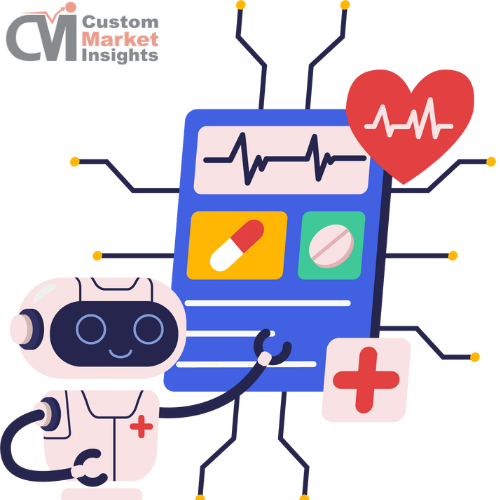The medical world is undergoing rapid transformation, and artificial intelligence (AI) is at the center of this revolution. From disease prediction to customized treatments, AI is no longer a buzzword, it’s saving lives, reducing expenses, and enhancing patient care.
As we head into 2025, here are the 15 most popular AI trends that are going to define the future of medicine.
- AI-Powered Diagnostics
AI is becoming increasingly effective at diagnosing illnesses such as cancer, stroke, and heart disease earlier and more accurately than the conventional ways. Technologies such as image recognition can scan X-rays, MRIs, and CT scans within seconds, assisting physicians in making faster decisions.
- Predictive Analytics for Early Intervention
AI can now analyze health information and identify early warning signs for illness. Hospitals utilize this technology to forecast who will develop conditions such as diabetes, sepsis, or even mental illnesses long before they show symptoms.
- Tailored Treatment Plans
AI is enhancing precision medicine. AI software can recommend customized treatments by examining a patient’s genes, lifestyle, and medical background.
- Virtual Health Assistants
Consider them as intelligent, omnipresent nurses. Such AI-powered chatbots and virtual assistants can respond to questions regarding health, prompt medication, and even schedule appointments.
- Robotic Surgery Assistants
Surgically guided robots powered by AI are enhancing surgical accuracy, minimizing complications, and aiding patients in quicker recovery. AI also helps in pre-surgery planning.
- Natural Language Processing (NLP) for Clinical Documentation
Physicians spend considerable time writing notes. NLP-based AI tools can translate speech into text and even grasp context, saving time and minimizing errors in patient records.
- AI in Drug Discovery
It takes years to develop new drugs. AI can accelerate this by processing data to identify promising compounds and anticipate how they will behave, possibly reducing R&D expenses.
- Remote Patient Monitoring (RPM)
AI enables doctors to keep track of patients remotely with wearables and smart devices. It can monitor heart rate, blood sugar, sleep patterns, and more, and remind healthcare professionals if something is amiss.
- AI for Medical Imaging
AI technology can now identify early indicators of illness in medical images that may go unnoticed by the human eye. Oncology, cardiology, and neurology are applying these tools.
- AI-Powered Mental Health Tools
Virtual therapists and apps are employing AI to track mental health, conduct therapy sessions, and even identify depression or anxiety symptoms using voice, text, or facial cues.
- Fraud Detection and Billing Automation
AI assists healthcare professionals in identifying fraud, coding discrepancies, and billing errors. It is also capable of automating claim processing, allowing billing to become smoother and faster.
- Population Health Management
AI tracks and maintains the health of populations. It considers data patterns to forecast outbreaks, enhance public health regulations, and spend resources wisely.
- AI-Powered Telemedicine
AI enhances virtual consultations through symptom analysis assistance, patient triage, and follow-up for doctors. AI ensures that patients receive appropriate care at the right time.
- Genomic Analysis
AI can rapidly review vast amounts of genomic data and assist researchers in discovering links between genes and illnesses. Such discoveries could result in cures and a deeper understanding of unusual conditions.
- Healthcare Algorithm Bias Detection
Bias is one of the largest issues in AI. In 2025, anticipate additional tools that detect and correct bias in healthcare algorithms, providing fair and equal care to all patients.
Quick Comparison: Human vs AI in Healthcare Tasks
| Task | Human Approach | AI Approach |
| Diagnosing X-rays | Hours/days | Seconds |
| Monitoring patients remotely | Manual follow-ups | Real-time alerts with wearables |
| Writing medical records | Time-consuming typing | Voice-to-text with context |
| Discovering new drugs | Years of trial & error | Predictive modeling in months |
Final Thoughts
AI in healthcare isn’t about replacing doctors, it’s about helping them do their jobs better. With smarter tools, faster insights, and personalized care, patients can expect better outcomes and a more connected experience. That said, it’s crucial to keep ethical use and data privacy at the core of every AI solution.
As we look ahead to 2025, one thing is clear: AI isn’t the future of healthcare anymore, it’s the present, and it’s only getting better.


